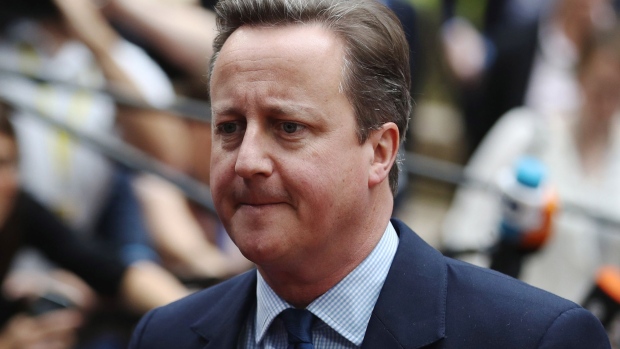Apr 20, 2021
Cameron and Sunak Asked to Give Evidence in Greensill Hearings
, Bloomberg News

(Bloomberg) -- An influential panel of U.K. lawmakers sought evidence from former Prime Minister David Cameron and Chancellor of the Exchequer Rishi Sunak as it probes whether the Treasury responded appropriately to lobbying from Greensill Capital to access coronavirus aid programs.
Treasury Committee Chairman Mel Stride on Tuesday wrote to the two men and Bank of England Governor Andrew Bailey as part of a probe announced last week into the failure of Greensill and Cameron’s lobbying of Sunak.
“There are questions to be answered in relation to Greensill Capital regarding the operation of the U.K.’s financial system and its regulation,” Stride said in a statement. “Also, whether the Treasury responded appropriately to lobbying from Greensill during the pandemic.”
Snowballing revelations about the depth of Greensill’s contacts within government have seen ministers including Sunak and Health Secretary Matt Hancock draw scrutiny. The crisis has also exposed how some civil servants held roles at the now-collapsed lender while still in their public posts.
That’s prompted a slew of inquiries, including one announced last week by Prime Minister Boris Johnson that aims to establish how Greensill’s supply chain finance contracts work and how representatives including Cameron -- who was employed by the lender -- engaged with ministers.
Sunak ‘Pushed’ Officials
The cross-party Treasury Committee announced its own investigation last week, and aims to hold its first evidence session on April 28, with “relevant experts,” it said.
The panel intends to call Sunak and Cameron in to give oral evidence, as well as Lex Greensill, the Australian businessman who founded the company at the heart of the controversy.
Stride also wrote to Financial Conduct Authority Chief Executive Officer Nikhil Rathi and Charles Donald, chief executive officer of U.K. Government Investments.
The probe came after Sunak released text messages showing he’d told Cameron that he’d “pushed” his officials to consider ways to help Greensill, which was seeking to tap the government’s Covid Corporate Finance Facility program administered by the BOE.
In his letter to Sunak, Stride laid out some detailed questions on the Treasury’s interactions with Greensill. The department has already released some emails and records relating to the meetings it held with the lender, but with sections redacted because of commercial sensitivity.
The committee asked to see those “unredacted, except for the names of more junior officials.”
Timeline
He requested a timeline of any contact the Treasury had with Greensill, details of any meetings between the department, its ministers andits agencies in which Greensill came up. He also asked for an “estimate” of the Treasury resources that went into assessing Greensill’s requsts to access the CCFF, and how that compared with other companies seeking access.
Stride also noted that in response to a freedom of information request, the Treasury had responded “officials also engaged with a wide range of supply chain finance firms in the same time period to inform policy development.”
“Please could you provide details of the number of these firms and the extent of HMT engagement with them?” Stride wrote. “In general did these firms receive the level of consideration (in terms of number of meetings, duration and seniority of HMT participants) as that received by Greensill?”
In his letter to Cameron, Stride sought details of the former premier’s interactions with Sunak and two junior Treasury ministers, as well as with officials. He asked Bailey for details of the Bank of England’s interactions with Greensill and with the Treasury, where they concerned the lender.
Greensill collapsed in March in one of the most spectacular financial blow-ups of recent years. That has put thousands of jobs at risk at U.K. plants owned by Liberty Steel, part of the GFG Alliance, which relied on Greensill for financing.
©2021 Bloomberg L.P.







